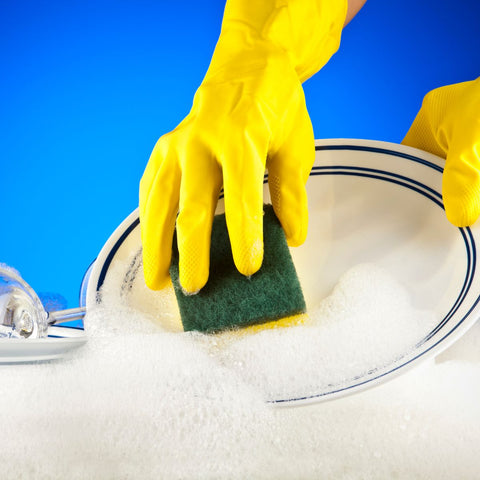Why Eco-Friendly Dish Soap Is a Must-Have For Green Homes
Written by Jazmine Roxas — September 29, 2023

In recent years, environmental concerns have skyrocketed, especially when it comes to household items that we use daily but rarely give a second thought. One such essential yet often overlooked product is dish soap. Here, we will delve into why you should consider switching to eco-friendly dish soap as a step towards a green household.

The Problem with Conventional Dish Soaps
Water Pollution
Water pollution is a significant problem closely linked to the use of conventional dish soap. Many of these soaps contain phosphates and other chemicals that are not eco-friendly. When we wash our dishes, this soapy water eventually ends up in our rivers, lakes, and oceans. As a result, these harmful substances seep into our natural water systems, contaminating them to varying degrees. This is a serious issue that requires urgent attention because it doesn't just affect humans. Animals, plants, and other forms of life that depend on clean water are also at risk.
Harm to Aquatic Life
Now, let's shift our focus to the underwater world, which is home to fish, plants, and many other aquatic beings. The chemicals found in most of the dishwashing liquids we use are harmful to these water inhabitants. Over time, these harmful substances can reach critical levels, disrupting the natural balance and making survival increasingly difficult for aquatic life. In some instances, the chemicals can lead to widespread death among fish and other organisms, upsetting the entire aquatic ecosystem.
Persistence of Toxic Residues
You might wash your dishes and think that once you've rinsed them clean, everything is okay. However, that's far from the actual reality. The chemicals present in many dish soaps don't just disappear; they persist in the environment. After you've rinsed your dishes and the water has gone down the drain, these chemicals can linger in the water systems for a long time. They can even end up in the soil and air, causing widespread environmental degradation. These persistent residues aren't just bad for the earth; they can indirectly affect human health too. It is then essential to consider the long-term impact of these substances as they can be detrimental to both the environment and us.
Eco-Friendly vs. Standard Dish Soaps
Biodegradability
Biodegradable dish soap offers a significant environmental advantage by breaking down naturally in the environment over a relatively short period. They offer a sustainable alternative to conventional soaps by employing natural processes for decomposition, which significantly reduces environmental impact. The benefits of switching to biodegradable soaps are manifold:
- Organic Ingredients: These soaps are composed of organic materials such as plant-based oils and natural extracts that microbes can easily break down. These organic compounds are not only gentle on the skin but also on the environment. By using resources that are naturally abundant and renewable, these soaps avoid the environmental degradation associated with harvesting synthetic ingredients. This makes biodegradable soaps an excellent choice for those looking to reduce their ecological footprint while maintaining high standards of personal hygiene.
- Eco-Friendly Decomposition: The design of biodegradable soaps ensures that they break down quickly once disposed of, unlike conventional soaps that may contain synthetic chemicals that do not decompose and can accumulate in ecosystems. This characteristic prevents the formation of environmental pollutants that can disrupt local wildlife and plant life. Moreover, the absence of harsh chemicals means that these soaps are safer for use around bodies of water, where they can break down without contributing to pollution or harming aquatic life.
- Protects Ecosystems: The rapid and natural breakdown of biodegradable soaps is crucial in preventing the build-up of toxic chemicals in the environment. By disintegrating into harmless substances, these soaps do not contribute to the long-term pollution of water systems or soil. This helps to maintain the natural balance of ecosystems and supports the health of various species that depend on these environments. The use of biodegradable soaps is a proactive step towards protecting and sustaining biodiversity for future generations.
Choosing biodegradable soaps is a practical step towards environmental stewardship. By opting for products that are kind to the planet, consumers play a part in reducing chemical pollution and promoting the health of global ecosystems.
Natural Ingredients
When exploring the best eco-friendly dish soaps, the use of natural ingredients is a predominant feature. These soaps harness the cleaning power of substances derived from nature—such as coconut oil, lemon extract, and lavender oil—not only to achieve effective cleaning results but also to offer a safer product for both the environment and human health. Coconut oil is prized for its grease-cutting abilities, while lemon provides natural antibacterial properties and a fresh scent. Lavender adds a calming aroma and can also soothe skin. These natural ingredients biodegrade more readily than synthetic alternatives and are typically harvested sustainably, ensuring that the production process maintains ecological balance and reduces environmental footprints.
Reduced Chemical Impact
By incorporating natural cleaning agents, these soaps avoid the introduction of harsh chemicals into ecosystems, which can lead to water pollution and negatively affect wildlife and plant health. The reduced chemical content not only makes these plant-based dish soaps safer for the environment but also for consumers, who benefit from fewer skin irritants and health risks in their home environments. Additionally, the production processes for eco-friendly soaps often consume less energy and produce fewer byproducts, further mitigating their environmental impact. This approach aligns with a broader environmental consciousness that prioritizes sustainability and the preservation of natural resources.
Other Differences
Beyond the use of natural ingredients and enhanced biodegradability, eco-friendly dish soaps distinguish themselves through several other ethical practices. Responsible packaging choices are common, with manufacturers opting for recycled materials or biodegradable packaging to reduce waste. Many eco-friendly dishwashing soap brands adhere to ethical manufacturing practices, ensuring fair labor conditions and minimal environmental impact during production.
Cruelty-free testing is another crucial aspect. It highlights the ethical commitment of eco-friendly dish soap brands, offering a product that aligns with the values of compassionate consumers. These soaps not only clean effectively but also advocate for ethical practices, environmental care, and sustainable living. Here's a look at their benefits:
- Cruelty-Free: Commitment to cruelty-free practices is a fundamental aspect of many eco-friendly dish soap brands. By avoiding animal testing, these companies ensure that their product development processes are humane and ethical. This approach not only satisfies ethical standards but also appeals to a growing demographic of consumers who prioritize animal welfare in their purchasing decisions. Brands that adopt this stance often receive certifications from recognized organizations, enhancing their credibility and appeal in the market.
- Effective Cleaning: Eco-friendly dish soaps are formulated to tackle tough kitchen grease and dirt effectively, despite being gentle on the environment. This effectiveness ensures that consumers do not have to compromise on cleaning power when choosing environmentally responsible products. These natural ingredients are often kinder to the skin, making them a preferable choice for individuals with sensitivities.
- Ethical Responsibility: Using eco-friendly dish soaps aligns consumers with broader ethical responsibilities, supporting global sustainability efforts and promoting kindness towards all beings. By choosing these products, consumers contribute to a market demand that values ethical labor practices, fair trade, and responsible resource management. This choice has a ripple effect, encouraging more companies to consider ethical implications in their business models and fostering a more sustainable and equitable industry.
Eco-friendly dish soaps represent more than just cleaning products; they are a testament to a sustainable and ethical way of living. By choosing these soaps, consumers support a cycle of kindness and responsibility that extends beyond the kitchen, influencing broader societal and environmental change.

Benefits of Using Eco-Friendly Dish Soaps
Immediate Benefits
You don't have to wait long to see the advantages of using eco-friendly dish soap. The best sustainable dish soap can be used in greywater systems, providing a safer alternative for irrigating your garden. You expose yourself to fewer chemicals, making it an excellent choice for households, especially those with children or pets.
Long-term Benefits
While the immediate advantages are gratifying, long-term benefits are equally significant. Using eco-friendly dish soap consistently means you're playing a part in reducing the demand for harmful chemicals, thus encouraging the market to produce more eco-friendly alternatives. This, in turn, has a ripple effect on the environment.
The Wider Impact on the Global Ecosystem
Reduced Plastic Waste
As discussed previously, manufacturers of these products often opt for packaging that is recyclable, compostable, or made from previously recycled materials. This shift towards sustainable packaging solutions significantly reduces the reliance on new plastics, which are typically derived from non-renewable petroleum resources and are notorious for their long-term environmental impact. By choosing eco-friendly dishwashing liquids with eco-conscious packaging, consumers actively participate in minimizing plastic waste. This not only helps in reducing the amount of waste that ends up in landfills and oceans but also supports the broader goal of a circular economy, where materials are reused and continuously recycled.
Energy Conservation
Manufacturers of these products invest in technologies that require less energy, such as cold-water formulations for laundry and dishwashing detergents that are effective without the need for heating water. By supporting these products, consumers contribute to significant energy conservation efforts. This is crucial as energy production is one of the largest sources of global carbon dioxide emissions, which drive climate change. When you purchase eco-friendly products, you are not only ensuring that the materials and processes are sustainable but also that the energy used in their production is kept to a minimum, further reducing your carbon footprint.
Role of Individual Choices
While the switch to an eco dish soap by one person may seem trivial, it's important to consider the cumulative effect of millions of people making similar choices. Each sustainable decision contributes to a larger pattern of behavior that can drive corporate and policy changes. Manufacturers notice the shift in consumer preferences and may alter their production practices to meet this demand, leading to broader environmental benefits. The widespread adoption of eco-friendly products can influence legislative frameworks, leading to stricter environmental regulations and standards. Hence, individual actions are a powerful catalyst for systemic change, underscoring the significance of every choice in fostering a sustainable future for the planet.
Shopping for Genuine Eco-Friendly Dish Soaps
Reading Labels
When shopping for the most natural dish soap, it's essential to make informed decisions that prioritize environmental sustainability. Evaluating products based on several key factors can ensure that your choice not only cleans effectively but also minimizes environmental impact. Here’s a guide to help you navigate your options:
- Read Labels: Carefully inspecting the ingredient list on dish soaps is vital. A truly eco-friendly product will use natural, plant-based ingredients instead of harsh chemicals. Ingredients like coconut oil or aloe vera are common in eco-friendly soaps. Avoid products containing phosphates or sulfates, which can harm aquatic life and cause pollution.
- Look for Certifications: Labels such as USDA Organic, EcoCert, or the Leaping Bunny logo signify that a product meets stringent environmental and ethical standards during production. These certifications ensure that the ingredients are sustainably sourced and that the manufacturing processes cause minimal environmental harm. They also often imply that the company adheres to higher labor standards.
- Check Reviews: Before making a purchase, it is wise to read reviews from other consumers. These can provide insights into how well the soap performs in terms of cleaning efficiency and whether it lives up to its eco-friendly claims. Reviews can also reveal how the soap affects sensitive skin or if it leaves any residues, which are important factors for many users. Feedback from like-minded consumers can reassure you that the product you choose aligns with both your cleaning and environmental needs.
It requires a thoughtful examination of ingredients, certifications, packaging, and user experiences to ensure that your choice is truly beneficial for the planet and effective for your household cleaning needs. Armed with the right information, you can feel confident that your purchase supports sustainable practices and contributes to a healthier environment.

Other Shopping Tips
Some companies offer refill stations for their products, which can be a great way to reduce waste. Before using these services, it's crucial to assess the environmental commitment of the brand. Look for transparency in their sustainability reports and commitments to eco-friendly practices beyond just offering refill options. A company that integrates sustainability into its core business strategy is more likely to contribute genuinely to environmental conservation.
While you're switching to eco-friendly dish soap, why not consider other eco-friendly kitchen items as well? Consider using a kitchen surface cleaner made from natural ingredients. If you're washing dishes by hand, pamper yourself with an organic hand cream and choose the best natural hand moisturizer to keep your hands soft. These small shifts can make a huge difference in making your household more sustainable. It's a small but impactful step in fostering a sustainable future for our planet. In making thoughtful choices in our daily lives, we're not just benefiting ourselves but also paving the way for future generations to inherit a healthier, happier Earth. So, why wait? Make the switch today!